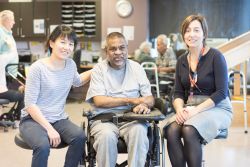New hope for peritoneal dialysis patients

Collaboration with St. Michael’s offers new hope for peritoneal dialysis patients needing rehab services
By Emily Dawson
It’s been a devastating and challenging year for Terry and Savitrie Ramnarine.
In February, they lost their only daughter, Terrisa, to a brain tumour at the age of 30. The toll on Terry Ramnarine’s health led to a massive stroke just weeks after his daughter’s funeral. He came to Providence Healthcare for rehabilitation in November, five long months after his stroke.
“I prayed every day to come here,” said Ramnarine, who was a Providence patient in 2016 and desperately wanted to return for his stroke rehab.

Most often, patients come to Providence days or weeks after their stroke, and evidence supports that early rehab leads to better long-term outcomes. But for Ramnarine — who also lives with diabetes — it was another health complication that prevented rehab hospitals, like Providence, to be able to accept him: he requires peritoneal dialysis (PD).
PD uses the lining of the abdomen and a cleaning solution called dialysate to clean the blood. It is part of a regular home-dialysis treatment plan and can be self-managed, rather than needing to attend dialysis appointments in an institutional setting.
While most acute-care hospitals safely and effectively manage PD needs, very few rehab facilities have staff trained in this treatment. It’s been identified as a major service gap in the city.
During Ramnarine’s five months in acute care, he received no active rehab.
“I was going into depression, just lying in bed the whole time. They gave me some exercises to do in bed but I wasn’t improving my strength or mobility,” said Ramnarine.
“Savitrie was with me all the time – every day, hours at a time – trying to keep my spirits up. She would get me into a wheelchair and take me through the local park. She’s my superwoman.”
In late October, Ramnarine learned about a new clinical collaboration between St. Michael’s Hospital and Providence. Fatima Benjamin-Wong, a home dialysis case manager from St. Michael’s, had been actively training 30 Providence staff with the goal of being able to admit rehab-eligible PD patients when needed.
“It’s a pleasure working with Providence’s A5 team, led by patient care manager Sofia da Silva,” said Benjamin-Wong. “I’m so impressed with how staff have embraced this learning opportunity, wanting to understand the holistic view of the renal patient and gaining confidence in providing PD.”
Benjamin-Wong has a long career in nephrology. “I understand PD patients. They will watch their care team like a hawk, because PD is their lifeline. They become the teachers. So while I’ve been able to train staff to get the service up-and-running, their ongoing learning will come from patients themselves.”
Ramnarine is Providence’s first patient with PD. “Everyone has gone above and beyond to make me comfortable. There have been growing pains as they learn PD and I teach them along the way. But it’s been so caring and I’m getting good rehab now.”
Even his wife is healthier. “I don’t need to come as often because I know he’s in good hands,” she said. “We are so glad that the next person won’t have to go through five months without rehab like Terry did.”
Ramnarine will be ready to return home in mid-December. When asked about his rehab so far, he said “the staff at Providence is what the system needs. They are caring and professional. They treat me with humanity.
“I want to say thank you to Providence for letting me tell my story.”
